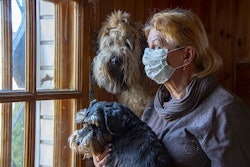The United States Department of Agriculture’s (USDA) National Veterinary Services Laboratories has confirmed SARS-CoV-2 (the virus that causes COVID-19 in humans) in a captive tiger at a zoo in New York. This is the first instance of a confirmed infection of COVID-19 in a tiger. Samples from this tiger were taken and tested after several lions and tigers at the zoo showed symptoms of respiratory illness, and it appears that the large cats became sick after being exposed to a zoo employee who was actively shedding the virus. New York City and its environs have seen more cases of COVID-19 than any other part of the United States.
“Given that this pandemic has infected hundreds of thousands of people and perhaps only a handful of animals, the imminent threat is human-to-human transmission,” noted Wayne Pacelle, president of Animal Wellness Action. “A handful of infected animal cases presents a vanishingly small risk because of their number and the difficulty of transmitting the disease efficiently. The bigger threat, when it comes to animals, are dangerous animal-use activities that can spawn a new virus, such as U.S.-based live-animal markets and cockfighting derbies.” Mr. Pacelle has written a series of essays on forms of animal use that do human and animal health risks, singling out wet markets, cockfighting derbies, and even game farms.
The transmission of the virus from human to animal is the second known documented case in the world after a person sick with the virus transmitted it to her dog in Hong Kong, as documented in a World Health Organization veterinary report.
Virologist Sarah LaMere, D.V.M., and a member of the Animal Wellness Foundation Veterinary Council, says the news isn’t unexpected, “We were already aware that cats could theoretically contract SARS-CoV2,” noted Dr. LaMere. “The virus uses the same receptor to enter cells as the original SARS, and we knew that domestic cats and ferrets were susceptible to that virus.” A paper published in China demonstrated efficient infection in domestic cats and ferrets under laboratory conditions.” Dr. LaMere says the most important information to absorb from this news is:
1. This confirms we are able to give this virus to some animals, but there is little evidence that they can transmit it to us efficiently.
2. While 1.26 million people in the world have tested positive for this virus, we only have very sporadic case reports of possible transmission to animals. Right now, it stands at one confirmed case in a dog, one possible case in a dog, two possible cases in domestic cats, and one confirmed case in a tiger. There have been no reported cases of transmission to domestic pets in the U.S. Wide-scale testing by Idexx in the U.S. and South Korea has yielded no positive cases of COVID-19 in pets, and Trupanion pet insurance has reported no increase in claims relating to possible clinical signs of COVID-19 among their 500,000 pet owners in the U.S.
3. The best advice is to isolate from pets as well as other people after someone has taken ill.
Tips for protecting your animals can be found here: https://animalwellnessaction.org/2020/03/06/pet-owners-and-policy-makers-should-exhibit-restraint-and-care-in-dealing-with-cases-of-coronavirus-in-pets/ .












